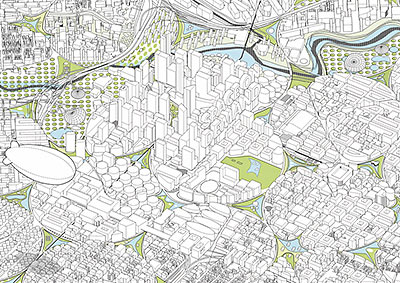
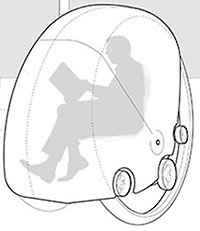
The folks over at Alloy Build think they’ve got a way to fix Houston and other sprawling cities like it: Get rid of the cars! The average vehicle, Alloy Build finds, just sits there doing nothing in a parking space for 21 hours a day. Why not use that space for something else? Once the cars are gone, the Boston design consultancy and think tank supposes, parking lots and garages and surface roads won’t be necessary anymore, either, freeing up all the wasted space in not-quite-dense-enough areas like Downtown to be grouped into dense, walkable “city cells” (i.e. neighborhoods). You’d have your office, your gym, your wine bar all right there inside your cell: It’s called “Shuffle City.”
It’s a little fanciful, the notion that Houstonians would just give away their cars. How would we get around? Well, “Shuffle City” is based on the assumption that we would freely relinquish the “ownership model” in favor of a system of shared self-propelled people-moving pods (shown at right) tracking along designated routes that encircle those “city cells.” Why drive, when you can pod? These appear to work the same way iTunes does: You can select the destination you want — Office, Gym, Vinoteca — or you can shuffle and see where the thing takes you. You know: For fun!
***
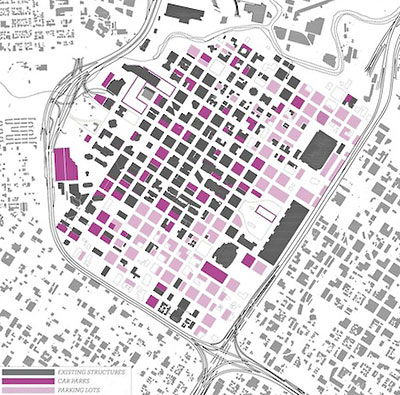
These 2 maps show how much space there might be Downtown, if you got rid of the parking lots and garages. (Those are denoted by pink.)
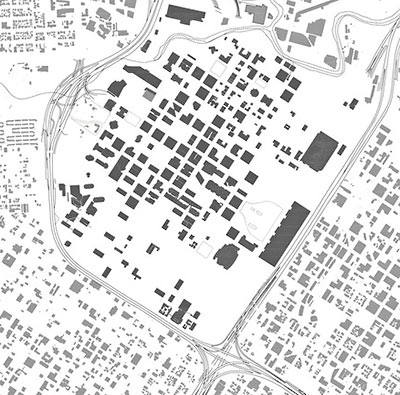
- Shuffle City [Alloy Build]
- Imagining A Future City Filled With Driverless Cars And Without Any Parking Spaces [Co.Exist]
Images: Alloy Build


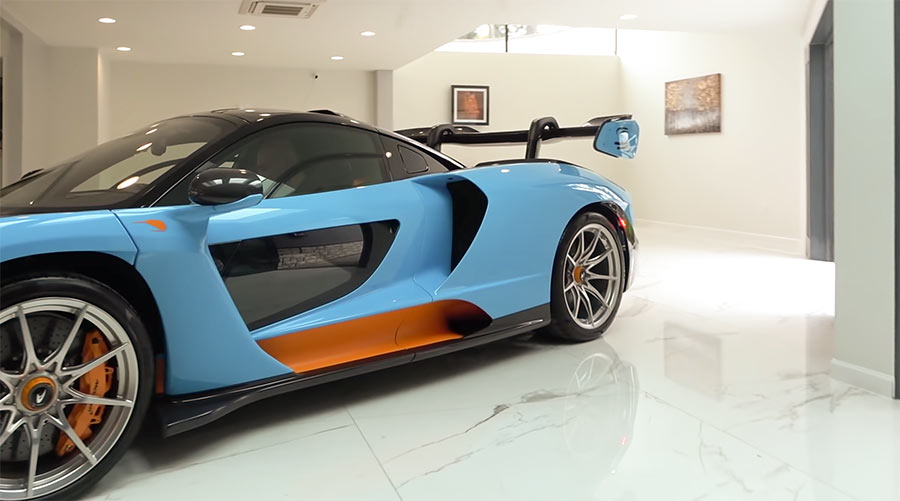

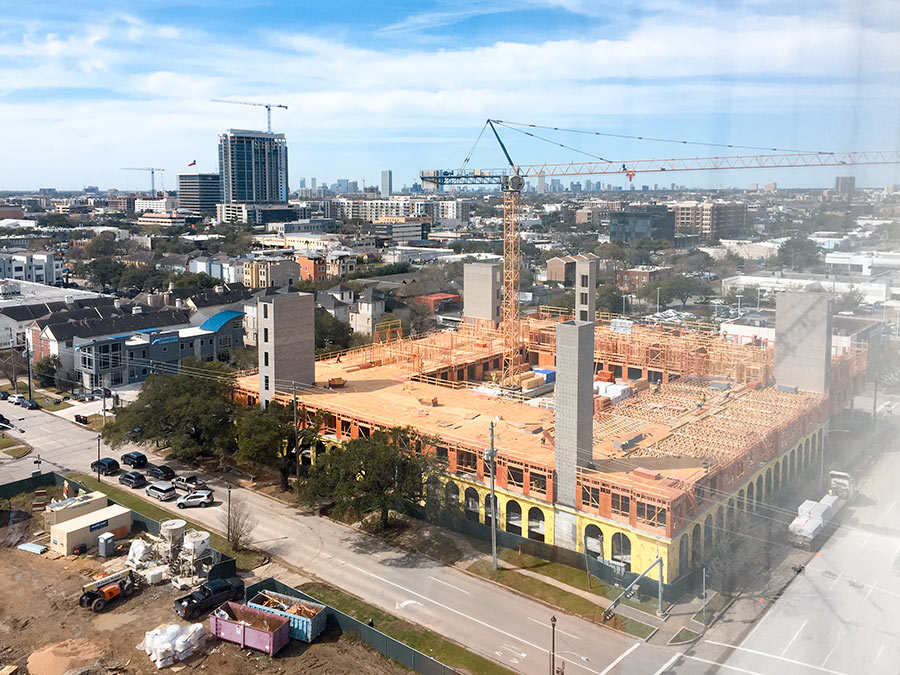
Get real.
Stay in Boston, please.
Right after warp travel and transferring one’s consciousness into a robot. Nice pipe dream but a waste of time for a practical person.
I have a shuffle thingy, it’s a bicycle.
.
I also have a powered shuffle thingy, it’s a motorcycle.
.
I also have a better idea. The city should pass an ordinance for any building that is primarily a surface parking lot that for every 4 parking spaces one tree is planted somewhere on the lot.
These ARE cars. They are self-driving cars, with an app to get a car on demand. That’s it!
What happened to the mass transit utopia that was supposed to make us all better people?
I used to watch The Jetsons, great show
This is the Swamplot version of an Onion story, isn’t it?
Is that a zeppelin on the far left? Is that what you use when you have to take your kids somewhere and they don’t fit in your pod?
We could hire the homeless to push the pods.
@anon – I’m fairly certain that urban density enthusiasts from Boston do not spend much time thinking about children.
I don’t see how the shared model helps with normal commuters, since most people would need them at the same time. The only benefit I see is the reduced size that is more appropriate for solo commuters. Toasty seems to have a better solution. Maybe we should just designate some existing lanes for smaller vehicles.
A horseless carriage you say? Poppycock and bullfeathers!
Go away! I like Houston the way it IS! HOUSTON: Love it or LEAVE it!
Why are people on this site such jerks? Obviously it’s just and interesting concept. Why not just enjoy reading someone’s thoughts and daydream a little?
I’m a fan of urban density. But this study is over the top. Where does Alloy build get its income?
The first downtown map above is shocking, showing that this city has really been created for machine cars and not for humans. So Houston is already a dense city–if you count cars and car infrastructure. It also points to a moral problem: in downtown, cars are preferably given shelters (garages) often equipped with electricity, ventilation and security, while at the same many humans live there homeless and without shelter.
wow, people sure do get creative. And we thought the one way freeway loop around DT was an crazy idea :)I’d have to carry lots of clorox wipes with me
@ScottC, you are right on man, people on here need a chill pill sometimes…
But it’s really not a new idea, ScottC. The general idea was taken straight from Moshe Safdie’s book “The City after the Automobile.” Their version of Safdie’s “U-Car” looks too much like Mr. Garrisson’s wheel-car from South Park. And the geometry of the “pods” – ugh – almost as heavy handed as Le Corbusier’s Plan Voisin for Paris.
I think that, over time and given advances in driverless car technologies, private ownership of cars will slowly give way to on-demand transportation. The premise of this article is dead-on: cars are assets that sit around unused most of the time.
I would love to simply call up a car and have it arrive at my front door ready to whisk me off to wherever. I could call for a single person occupancy vehicle if I’m alone, multiple person vehicle if I’m a family or group, and I could even call up a van or pickup if I need to load up or move bulky items.
@Larry, cars are an extension of people, they would not exist if people didn’t need them or didn’t desire them.
There is no moral issue you describe, homelessness is a mental disorder treatment issue not a financial issue.
For a dynamic international city, it is amazing how provincial people can be in Houston if you dare suggest anything outside the current comfort zone of strip malls, apartments and planned communities. The think tank guys make an interesting point. Setting aside the space buggies, this concept of city cells is actually being employed to some degree in places like Portland’s South Waterfront development and Washington DC’s Navy Yard re-development.
The reactions are agitated because it’s not what we’re used to.
When you think about it, it’s not so strange. Right now we already have a public dimension to our transportation: roads. We don’t insist on owning all the land we travel on, but instead share certain amounts of land, on which we build roads, and travel on that.
All this idea says is, why not share the vehicles too? Instead of all owning our own vehicles and not using them 21 hours a day, and meanwhile pour vast resources into paved surfaces and space to hold them when we’re not using them, why not have a much smaller amount of cars that we share?
The 20th century solution to this is the taxicab; I’d be interested in more details on how these “pods” are supposed to be different.
Holy cow this place is like the Chron.com comments section sometimes. Personally I believe the biggest change in transportation in the next 50 years won’t be high-speed rail or mass transit, it will be more in line with concept – removing the human element from driving. Because let’s face it, we suck at driving.
dreaming and conceptualizing are nice but that means nothing unless you build it and test it. It won’t stand a chance till then.
City CELLS is accurate; you’re a prisoner with limited freedom living like a bee in a hive. Is this what they teach in Urbanism classes at MIT apparently. Want to take a ride in the country or evacuate for a hurricane or drive somewhere without being tracked? You outta luck, Chuck. But that’s ok, it’s trendy to be dependent.
I’m always struck by how many of these futuristic visions seem to exalt the smart, driver-less car. I’m of the opinion that we already have the smart cars; what would be interesting would be to develop smart roads first and foremost. Roads that don’t wear down your tires as fast or self-heal pot holes. Freeways that could automatically report erratic drivers and speeders to the police. Roads that could suck up all the exhaust and filter it out as fresh air, focus lighting to limit light pollution in urban areas, and buffer/shape excess noise away from adjacencies. Redesigned freeways could be routed into our existing drainage infrastructure and so on. There’s always more than one way to skin a cat.
It looks like a miserable place to live. I enjoy driving and I don’t enjoy living like a sardine in high density.
@Dana-X: yes, when I’m sitting in stopped traffic on 610, I feel so *free.*
It astounds me that people are convinced that because something is a certain way today it will always be that way. The economics of different types of transit change. Technology changes. Needs change. We will cha he with them. When I was a kid we drive in a road so high tech that you could throw a quarter into a basket instead of giving it to a toll collector and you needed metal slugs to ride the subway. Now we have electronic till collection and HOT lanes. The self drivin lg technology will change things, including the economics of buying a vehicle for tens of thousands of dollars to leave it sitting unused most of the time. Will it look like what’s described above? Probably not. But some of those ideas are likely to show up in some form.
Also with any luck typing on virtual keyboard will improve.
So many haters to public transit and urbanism. I’d love to see it happen to Houston. I love my car, but could definitely downsize to 1 car if I didn’t have to drive everywhere.
I also hate parking garages with a passion. They’re ugly, take up huge amounts of space, and should be built underground.
PRT will be the wave of the future one day. The notion that you had to pay tens of thousands of dollars for your own transport that you must yet still provide power in the form of gasoline for will be laughed at one day. And the abstract idea that you had to pay some “insurance” company each and every month just incase your transport ran into another transport will be obscene. And after all that you must be trained to operate the machine. Even worse, we were forced to trust that everyone else operating their own machine had a clue what they were doing and weren’t drunk, or texting, or arguing with their husband over who was going to pick up the kids, or died of a heart attack.
*
When cost comparisons are made between mass transit and the highway model, the total cost of the systems should be considered–why wouldn’t you consider the $8k+ PER YEAR that each of the vehicles on the “Freeway” costs? The “Freeway” simply moves the vehicle expense from the builder to the user. I don’t know about anyone else, but I have to pay for my car, and insurance, and maintenance, and gas, and new tires, and parking, and car washes, and oil changes, and registration, and inspection…
I wonder if the high cost of housing in Boston and its suburbs has anything to do with Alloy Build’s Shuffle City concept. The dream of home ownership is increasingly out of reach for all but the wealthiest Bostonians. I should know, until very recently I had family up there. (My brother, a lawyer, had trouble finding a suitable house to buy, and wound up moving to Portland Maine). It’s becoming the norm to live in tiny apartments in Boston, and for most that also means foregoing a private car. So understandably, they would be more open than we are to the idea of urban cells and self driving public wheelie-pod-cars.
.
That said, I take issue with the quips about how Houstonians are “provincial” or how we don’t appreciate good architecture just because we think this concept is a dud. It hurts for me, in particular because as an architect I want nothing more than to live a comfortable life in a sustainable city, where I don’t -have- to drive everywhere. I’ve welcomed outside architects and artists to work here – I still fawn over New York Artist Mary Ellen Carrol’s Prototype 180 house in Sharpstown. But Alloy Build’s scheme falls flat. It’s too radical, and not in a new or good way. It’s heavy handed. It’s, frankly, scary.
Back in the 1950s or so, Victor Gruen (developer of the modern shopping mall) actually proposed something like this for Fort Worth (sorta). Encircle the downtown with a highway loop and lots of parking garages, and have the entire thing walkable.
Of course, when you’re talking “people pods”, you’re talking something decades ahead.
I don’t know about this “Shuffle City” pipe-dream, but a certain entrepreneur by the name of Elon Musk is set to have a big announcement about his hyperloop/Evacuated Tube Transport within a week. Everything the man touches seems to turn to gold, so we’ll see how this takes off.
*
Maybe the Japan Central Railway and Mr. Eckels can team up with Mr. Musk. Forget Houston to Dallas in 90 minutes with a bullet train. How about 20 minutes with the Hyperloop.
Tel Aviv is planning a pod transport system with individual pods going to user determined locations. NASA’s Ames Center designed this system. Isn’t that great that our tax dollars are funding R&D that will be implemented in foreign countries? http://www.businessweek.com/articles/2013-03-12/nasa-pod-transports-close-to-reality-in-tel-aviv
@John(another one). This isn’t just change as in make something better it’s making the city a place where you’re forced into a pod for transportation and some cell village to live. I really don’t want to be pushed into that. Am I’m wary of change and innovation where we’re losing freedom but gaining convenience, security or efficiency. That seems to be the way everything sold and is becoming. As the late Aaron Russo was told by Nick Rockefeller, when everyone’s got the chip, if you don’t toe the line, they turn your chip off and you can’t buy or sell anything. In this scenario, the Podfather turns off your pod or restricts your destinations. Imagine that.
“Houston……love it or LEAVE IT!” Why yes, thanks I did……Best decision I ever made. Once an armpit…..still an armpit…..and always an armpit.
Dana-X, I’m trying to understand how affordable transportation that takes you where you want to go is a loss of freedom. You need to think hard about the car=freedom concept. If you can’t afford the car, it’s not freedom. If you’re stuck on roads with everyone else driving their cars, it’s not freedom. If there’s nowhere to park, it’s not freedom. If you are injured and become disabled, it’s not freedom. If you get old and can’t drive anymore, it’s not freedom.
People are commenting on how Bostonians have to give up their cars because they have small apartments. Backwards. I’m an ex-Bostonian, and I lived car-free when I was in grad school. Bostonians often choose the small apartments and condos because they’re located in places that give them freedom from having to spend a lot of money on a car just to get around.
Best commute of my life was walking across the Massachusetts Avenue bridge from my apartment in the Fenway to my office in Cambridge. This was in the 80s when the bridge was under repair, so typically I could walk across faster than the cars could drive. 20 minutes, fresh air, and I got to watch everyone out on the Charles rowing. And I never, ever got stuck in a traffic jam on the sidewalk.
Freedom means going where you want to do what you want, and there’s a degree of freedom you get in a city where you don’t need a car that is very, very hard to match. And when you need a car, you’ve got that extra $8K you saved in car payments to pick up the tab for the rentals. Or a vacation to Australia.
Just visited Boston and we loved the place. We were facinated by the public transport, the city parks, the neighborhoods, and of course the history.
Regarding the idea in this thread, I’d say it’s interesting and it’s definitely thinking outside the box, which is very good indeed.
However, I personally believe that the chief consideration in this sort of urban design should be about the people living in the sprawling city and not necessarily the technology. Consider Jane Jacobs in the Greenwich village as she described the people interacting with the neighborhood as ‘the ballet of Hudson street’ (Ref. Leo Hollis’ book http://www.amazon.com/books/dp/1620402068).
Not against the spirit of this technological proposal but I must admit that I much more favor the interactions inherent in public transport as opposed to an ‘exoskeleton’ provided by cars or pods.
Can we at least get a lightrail system that doesn’t end in mostly useless areas?
The notion that a huge number of people would be willing to use vehicles on demand is perfectly sound. It’s not even a new concept. They are only driverless taxis. And just as taxis come in different shapes and sizes, so too can these vehicles. Need something more exotic to get off the grid? Take a driverless taxi to Hertz or Enterprise, rent what you need only when you need it.
Its true that there is a peak-period issue and that resolving that issue would result in a need for parking for the vehicles; however, the amount of space needed would be partially mitigated by their use throughout the day. Without drivers, the parking structures also become a whole lot more efficient.
One of the more intriguing concepts would be that an open source transportation operating system would provide for owners of fleets of specialty vehicles to plug in and market products on their strengths. Perhaps some vehicles are geared for a budget audience, with pricing reflecting that, while others are made to look gaudy or to be acoustically optimized. Some services could be guaranteed immediate on-demand, and non-stop, whereas others work on a carpool model. Some could allow for single-trip pricing; others could allow for a contract ranging from one month to several years, similar to how electricity marketers now operate. Some fleet providers might allow for family plans, as do cell phone providers; others might market themselves to employers as a group plan with individual opt-in, similar to how parking is currently done by many downtown employers right now.
The big up-side is that such a system largely eliminates the need for new road capacity, eliminates all but the most heavily-utilized fixed-route mass transit services, and provides efficient market pricing that enables people to weigh on how valuable their time really is. And the transition doesn’t have to happen all at once, but rather, can be gradual according to supply and demand; old traffic and new traffic can intermix.
The big problem is political, I think. I would fully expect that special interest groups and hordes of stupendously hard-headed fools would pull out all the stops to prevent positive changes like these.
Easy to discern which comments come from die-hard conservatives. Not only do they seem unwilling to consider solutions to what inevitably, if not already, becomes a deterrent to the region as a livable city, they sanely encourage the sprawl mentality, propose nothing in terms of viable alternatives, and lambast progressive concepts that reduce wasteful consumerism. – Sadly for all the local population, their insular attitudes and fantasy notions that the good of the community must yield to individual opportunities tightens the stranglehold on infrastructure progress that coming fuel shortages & price inflation demand. If this is the case and the best elements of forward-thinking concepts like Alloy Build’s don’t reach serious consideration, Houston then truly deserves a status as laughingstock of livability. Seems like we have to resort to pandering to the self-serving to get them to visualize that intelligent urban planning & enforcement must happen sooner or later upon this region. After all, corporate operations might be difficult if all the happy & willing people move and stay away as #13 proudly voices.
Will dogs be able to stick their heads out of the pods?
@John(another one);The freedom I’m talking about is having my car/pod in my driveway, going where I want to go, am I’m driving it, not a computer, whenever I want with no one tracking me. If my car becomes a more efficient vehicle that would be great. I’ve lived in SF with no car and it was ok but spontaneously going anywhere I wanted was impossible. Now this plan wants to herd people into swarms and eliminate car infrastructure and use computerized pods. They’d be hackable. What if the pod decides to drive into a tree? Malfunction or murder? Your every move would be monitored. Is that freedom? Like your neighbors enough to want to squeeze even closer to them? Not me. Barking dogs, power tools, music….they leave these details out of these progressive fantasies.
UBER-driverless!
People’s nature does not change… even if something like this is implemented, all it would mean is that the commute becomes easier and quicker… which means the sprawl would actually increase because people will be able to get a bigger, better house on more land further out and not worry about the commute. Progressives always think up of systems and utopias that look good on paper but always miss the mark on what people will actually do.
Pods. Schmods. We urbanites want air cars ala The Jetsons – with heavy duty A/C , unless the techies figure out some process to remove humidity from our swampy environs!!!
Tony: “Die hard conservative” (but more libertarian) here. I own a car and drive it maybe 4k miles a year. A while ago I got an electric skateboard and my car will often sit unused for a week. I think something like what is described in the story would be cool.
.
Try not to generalize so much. All you liberals do that! (see what I did? :)
So freedom is having to buy a $20,000+ object to sit in your driveway most of the day in case you want to go somewhere?
I’m not sure what’s hard about spontaneous trips in SF (or Boston or DC, where I’ve lived). Option 1: go outside and walk there. Option 2: Go outside and get on Metro and go there. Option 3: get a cab and get driven there. Option 4: ride a bike. Option 5: Rent a car for a couple of hours from Zipcar. And if you own a car (I did, for work) – drive it, deal with the parking and traffic. Options are good. In houston you have Option 5. It would be good to have some others also.
By the way, Dana, if you think a car is your key to avoiding surveillance, you’re quite mistaken. Cars are easy to track, and before long your car will have a black box in it recording your movements. If you take your phone with you when you drive (of course you do!) you’re already being tracked. You’re being tracked on toll plazas, by cameras, in parking garages, and lots of other places. If that one of your concerns I highly recommend you lose the car and start bicycling; you’ll have a bit more privacy.
I tend to agree with commonsense that this technology will more likely cause suburban sprawl rather than limit it. That doesn’t particularly bother me because if we can put more people outside of the urban core then it reduces price pressures inside the urban core and keeps it both interesting and affordable to a wider variety of people.